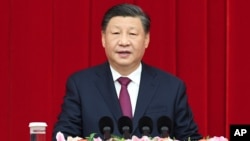Chinese President Xi Jinping issued a veiled warning to the United States in his new year message to the country, stressing that China will be engaged in "serious struggles" against separatism and interference in its relations with Taiwan, state media, CCTV and the Xinhua news agency reported Friday.
In a Lunar New Year reception in the Great Hall of the People attended by top party leaders in the Politburo, Xi said in a speech to the Chinese people that his party and the military have in the past year risen to the challenge of “high winds and choppy waters in the international situation,” a reference he also made in his speech at the 20th Party Congress in a warning about what he saw as a hostile international environment.
In a subtle message that referred to the United States and its relations with Taiwan, Xi vowed to “resolutely carry out major struggles against separatism and interference” and “firmly grasp the initiative in cross-strait relations,” state television, CCTV and Xinhua reported.
He also pledged to “make more friends” in the international arena and to actively engage in “major-country diplomacy with Chinese characteristics” to ensure stability in a “turbulent international environment.”
In recent years, the leadership has increasingly emphasized the importance of asserting a China-centered diplomatic and historical narrative and a determination to shift away from a Western-dominated world order.
On national defense, Xi said China has taken “solid steps” to modernize the defense and armed forces in the past year.
Xi, the chairman of the party’s Central Military Commission, also told the military in charge of border defense to raise their vigilance during the Lunar New Year and be ready for combat, according to a separate report in the Communist party’s flagship newspaper, the People’s Daily.
Xi spoke with soldiers responsible for border, coastal and air defenses via a video link ahead of the Lunar New Year and urged them to fulfil their “combat readiness” to safeguard national security and social stability to ensure “the Chinese people will be able to have a happy and safe Spring Festival.”
The report was prominently featured Friday on the front page of the People’s Daily, with a large portrait of Xi in an army uniform flanked by smaller photos of troops.
Xi’s securing of an unprecedented third term as the general secretary of the Chinese Communist Party has fueled speculation on whether he will try to forcefully reunify with Taiwan in the next few years.
China has often accused the United States of supporting Taiwan independence by sending “wrong, dangerous signals” to the island it considers a renegade province. It insists that issues related to Taiwan are “internal matters” that the United States has no right to interfere in.
U.S. President Joe Biden and Xi met at the G-20 summit last November, during which Biden raised U.S. objections to China’s “coercive and increasingly aggressive actions” toward Taiwan. Xi told Biden that the Taiwan question was at the “very core of China’s core interests” and the “first red line” in bilateral ties that must not be crossed.
While China has softened its aggressive “wolf warrior” rhetoric since the 20th Party Congress in October, analysts say the shift in tone should not be seen as a fundamental pivot in its position.
Wang Yi, who stepped down as foreign minister but now oversees China’s foreign policy after being promoted to the 24-member Politburo, wrote in the January issue of the party’s Qiushi magazine that China is against the “monopolization of the definition of democracy.” In reference to the U.S. on Taiwan issues, he denounced “interference in the internal affairs of other countries in the name of so-called democracy."
“China is not afraid of bullying and will build a strong defense to safeguard national interests and national dignity,” he wrote.





